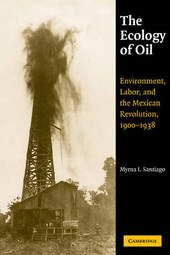
|
The Ecology of Oil: Environment, Labor, and the Mexican Revolution, 1900-1938
Paperback / softback
Main Details
Description
An exploration of the social and environmental consequences of oil extraction in the tropical rainforest. Using northern Veracruz as a case study, the author argues that oil production generated major historical and environmental transformations in land tenure systems and uses, and social organisation. Such changes, furthermore, entailed effects, including the marginalisation of indigenes, environmental destruction, and tense labour relations. In the context of the Mexican Revolution (1910-1920), however, the results of oil development did not go unchallenged. Mexican oil workers responded to their experience by forging a politicised culture and a radical left militancy that turned 'oil country' into one of the most significant sites of class conflict in revolutionary Mexico. Ultimately, the book argues, Mexican oil workers deserve their share of credit for the 1938 decree nationalising the foreign oil industry - heretofore reserved for President Lazaro Cardenas - and thus changing the course of Mexican history.
Author Biography
Myrna I. Santiago is Associate Professor of History at St. Mary's College of California. Before earning her Ph.D. in History from the University of California at Berkeley, she travelled to Mexico on a Fullbright Fellowship and later worked in Nicaragua as a Human Rights investigator. Her work has appeared in Environmental History.
Reviews"The research contained in this book is quite good, [...] [Santiago's] contributions to the budding scholarship on environmental change in Mexico deserve notice. [...]There is much of great value in Santiago's book." -Emilio Kouri, University of Chicago, American Historical Review "...the author had produced an imaginative and well researched account of oil development in the Mexican Huasteca." -Peter Linder, The Americas
|